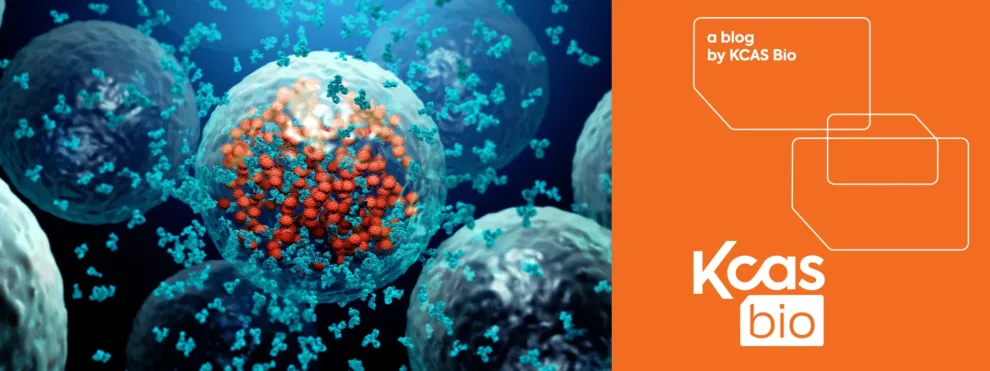What Are ADA Assays and Why Do They Matter?
In both preclinical and clinical studies, evaluating immunogenicity, the immune system’s response to a foreign substance, is a critical factor. Anti-drug antibody (ADA) assays play a pivotal role in this evaluation, helping researchers and pharmaceutical companies determine how the immune system reacts to therapeutic drugs.
What Is Immunogenicity?
But what exactly is immunogenicity? Simply put, it’s the ability of a foreign substance, like an antigen, to provoke an immune response in the body. This can be either a wanted or unwanted reaction.
- Wanted immunogenicity is the desired immune response, such as when a vaccine triggers the body to develop protection against future exposure to a pathogen.
- In contrast, **unwanted immunogenicity** occurs when the immune system reacts against a therapeutic drug. This leads to the production of ADAs, which can potentially compromise the drug’s safety and efficacy.
While ADA assays detect whether anti-drug antibodies have formed, assessing whether those antibodies truly interfere with drug function requires neutralizing antibody (NAb) testing, see our blog “Neutralizing Antibody (NAb) Assays: Cell-Based vs. Non-Cell-Based” for a detailed comparison.
Understanding the ADA response is crucial for both drug developers and healthcare providers to ensure that treatments are both safe and effective for patients.
Clinical vs. Preclinical ADA Assays: What’s the Difference?
When it comes to ADA testing, there are notable differences between clinical and preclinical assays. Clinical ADA assays require drug-specific critical reagents and follow a stringent, three-tiered approach for screening, confirming, and titrating ADAs. However, preclinical or nonclinical ADA assays have more flexibility. The **ICH S6 guidelines** (2012) outline the situations in which ADAs should be evaluated in preclinical studies, such as when there’s evidence of altered pharmacodynamics (PD), unexpected changes in exposure, or immune-mediated reactions like anaphylaxis or vasculitis.
Regulatory Context
According to the ICH S6 (R1) guidelines (2012), preclinical ADA evaluation is recommended when:
- Altered pharmacodynamics are observed,
- There are unexpected shifts in drug exposure, or
- Immune-mediated reactions (e.g., anaphylaxis, vasculitis) occur.
Benefits of Using Generic ADA Assays
In preclinical species like mice or non-human primates, generic ADA assays provide an efficient and cost-effective option. Built with commercially available reagents, these assays reduce the need for time-consuming and expensive antibody development.
At KCAS Bio, our team has developed a library of in-house tested, commercially available antibodies to use in a generic ADA assay. A generic ADA assay offers:
- Reliable performance
- Reduced development time
- Budget-friendly solutions
Generic ADA Assays: A Time-Saving, Cost-Efficient Approach
In preclinical studies, especially when testing on species like mice or non-human primates, using a **generic ADA assay** can be a smart choice. These assays, developed using commercially available reagents, offer reliable results without the need for an immediate, expensive investment in an antibody campaign. At KCAS Bio, we recognize the importance of streamlined assay development. Our scientists have built a robust library of in-house tested commercially available reagents in generic ADA assays, helping clients save both time and resources while ensuring accurate data.
Lean ADA Assays: Efficient Solutions for Preclinical Testing
What Is a Lean ADA Assay?
While conventional ADA assays follow a three-tier structure, **lean ADA assays** are often more suited for the preclinical and nonclinical phases. These assays typically require only two of the three tiers, such as screening and titer, or screening and confirmation, depending on the specific drug being tested. Additionally, when a positive control hasn’t been developed, a commercially available polyclonal antibody can often be used, further simplifying the process.
Streamlining Without Sacrificing Quality
Lean assays often rely on commercially available polyclonal antibodies when no positive control is available. Despite the simplicity, they remain scientifically rigorous.
KCAS Bio’s Approach to ADA Assay Development
At KCAS Bio, we have vast experience in immunogenicity testing. Our team of expert scientists has years of experience developing ADA assays for both preclinical and clinical applications. Want to learn more about how generic or lean ADA assays can support your drug development process? Reach out to KCAS Bio today! We’re here to help you navigate the complexities of ADA assay development with ease.

